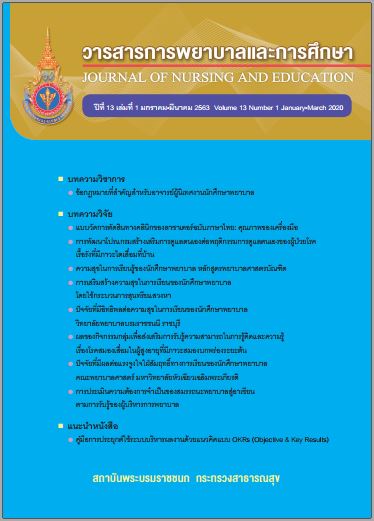การเสริมสร้างความสุขในการเรียนของนักศึกษาพยาบาล โดยใช้กระบวนการสุนทรียแสวงหา
The Enhancement of Happiness in Studying of the Nursing Students Using an Appreciative Inquiry Process
คำสำคัญ:
ความสุข, กระบวนการสุนทรียแสวงหา, นักศึกษาพยาบาลบทคัดย่อ
บทคัดย่อการวิจัยครั้งนี้มีวัตถุประสงค์เพื่อศึกษาผลการเสริมสร้างความสุขในการเรียนของนักศึกษาพยาบาลโดยใช้กระบวนการสุนทรียแสวงหา เป็นการวิจัยเชิงปฏิบัติการแบบมีส่วนร่วม คัดเลือกผู้เข้าร่วมการวิจัย แบบเจาะจงด้วยแบบวัดความสุขในการเรียน คือ นักศึกษาพยาบาลชั้นปีที่ 2 มหาวิทยาลัยราชภัฏ สุราษฎร์ธานี ปีการศึกษา 2561 ที่มีระดับความสุขในการเรียนต่ำ จำนวน 12 คน เครื่องมือ ได้แก่ แบบคำถามสนทนากลุ่มที่สร้างขึ้นจากกรอบแนวคิดโปรแกรมสุนทรียแสวงหา 4 ขั้นตอน ได้แก่ 1) การค้นพบประสบการณ์ 2) การสร้างฝันภาพ 3) การออกแบบวิธีการปฏิบัติ และ 4) การลงมือปฏิบัติเพื่อสานฝันให้เป็นจริง และสร้างความเชื่อถือได้ด้วยการตรวจสอบสามเส้าด้านบุคคลผู้ให้ข้อมูล วิธีการเก็บข้อมูลใช้การสังเกตแบบมีส่วนร่วม การสนทนากลุ่ม และการทบทวนหลังการปฏิบัติ วิเคราะห์ข้อมูลเชิงคุณภาพด้วยการวิเคราะห์เนื้อหา
ผลการวิจัย พบว่า ความสุขในการเรียน มี 3 ประเด็น ได้แก่ การมีความสามารถด้านการเรียน การมีความสามารถด้านการดูแลผู้อื่นและครอบครัว และการได้รับการยอมรับจากสังคม ภาพฝันที่เสริม สร้างความสุขในการเรียน ได้แก่ การมีสัมพันธภาพที่ดีกับผู้อื่น และสำเร็จการศึกษาในระยะเวลา ที่กำหนด กิจกรรมเสริมสร้างความสุขในการเรียน มี 4 กิจกรรม ได้แก่ การรวมกลุ่มแลกเปลี่ยนประสบการณ์ การเตรียมความพร้อมในการเรียนทั้งภาคทฤษฎีและภาคปฏิบัติ การสำรวจตนเองเพื่อแก้ไขและพัฒนา และการขอคำแนะนำจากบุคคลที่ไว้วางใจ และ ผลลัพธ์การปฏิบัติ มี 3 ประเด็น ได้แก่ การเข้าใจบทเรียนเพิ่มขึ้น คะแนนสอบวัดความรู้ดีขึ้นและผ่านตามเกณฑ์ และการมีความวิตกกังวลลดลง
ผลการวิจัยนำไปใช้จัดกิจกรรมการเรียนรู้ เพื่อทำให้นักศึกษาพยาบาลเกิดความสุข และประสบความสำเร็จในการเรียน
เอกสารอ้างอิง
1. Sinsawad P, Pittard B. Factors Related to Quality of Life of Nursing Ntudent at Boromarajonani College of Nursing, Ratchaburi. Kuakarun Journal of Nursing, 2016; 23 (1): 8-20. (in Thai)
2. Doyle K, Sainsbury K, Cleary S, Parkinson L, Vindigni D, McGrath I, et al. Happy to Help/Happy to be Here: Identifying Components of Successful Clinical Placements for Undergraduate Nursing Students. Nurse Education Today, 2017; 49: 27-32.
3. Mahakittikun K, Suwanchinda P, Chanchong W. Adolescent students’ happiness. Songklanagarind Journal of Nursing, 2016; 36 (1): 87-98. (in Thai)
4. Sricamsuk SA, Voraharn W, Senarak W. Happiness of Undergraduate Nursing Students,
Faculty of Nursing, Khon Kaen University. Journal of Nursing Science & Health, 2011;
34 (2): 70-79. (in Thai)
5. Bundasak T, Chaowiang K, Jangasem N. Happily Learning Among Nursing Students. Journal of MCU Peace Studies, 2017; 5 (1): 357-369. (in Thai)
6. Sharif F, Masoumi S. A Qualitative Study of Nursing Student Experiences of Clinical Practice. BMC Nursing, 2005; 4 (6): 1-7.
7. Kawsaard N, Arpanantikul M, Putwatan P. Selected Variables Related to Nursing Students’ Happiness. Thai Journal of Nursing Council, 2013; 28 (1): 19-33. (in Thai)
8. Mark C, Heather Carter-Templeton, Rita H, Talicia T, Mark P. Attrition of Medical Students and Nursing Students with Anxiety and Depression: A Systematic Review. Annuals of Behavioral Science and Medical Education, 2015; 21 (1): 30–37.
9. Papastavrou E., Maria D, Haritini T, Christos A. Nursing Students’ Satisfaction of the Clinical Learning Environment: a Research Study. BMC Nursing, 2016: 1-10.
10. Thongsom P. The Development of Indicators of Happiness in Learning of Student in Nursing Science Undergraduate Programs under the Ministry of Public Health. Journal of Nursing and Education, 2011; 4 (1): 88-96. (in Thai)
11. Chimanlal HP. A Comparative Study of Happiness Index’ in Medical and Paramedical students. Happiness Index’ in Medical and Paramedical Students, 2015; 2 (6): 91-97.
12. Rattanapun P. What is Appreciative Inquiry? and who do you use? 2011. [cited 2016 April 14]. Available from: https://www.gotoknow.org/posts/314324. (in Thai)
13. Ridley-Duff JR, Duncan G. What is Critical Appreciation? Insights from Studying the Critical Turn in an Appreciative Inquiry. Human Relations, 2015; 68 (10): 1579–1599.
14. Trajkovski S, Schmied V, Vickers M, Jackson D. Using Appreciative Inquiry to Transform Health Care. Contemporary Nurse, 2013; 45 (1): 95–100.
15. Watkins S, Dewar B, Kennedy C. Appreciative Inquiry as an Intervention to Change Nursing Practice in-Patient Settings: An Integrative Review. International Journal of Nursing Studies, 2016; 60: 179–190.
16. Tosati S, Lawthong N, Suwanmonkha S. Development of an Appreciative Inquiry and Assessment Processes for Students’ Self-Knowing and Self-Development. Procedia - Social and Behavioral Sciences, 2015; 191: 753–758.
17. Photisita C. Qualitative Research. Bangkok: Amarin Printing and Publishing Company Limited, 2013. (in Thai)






